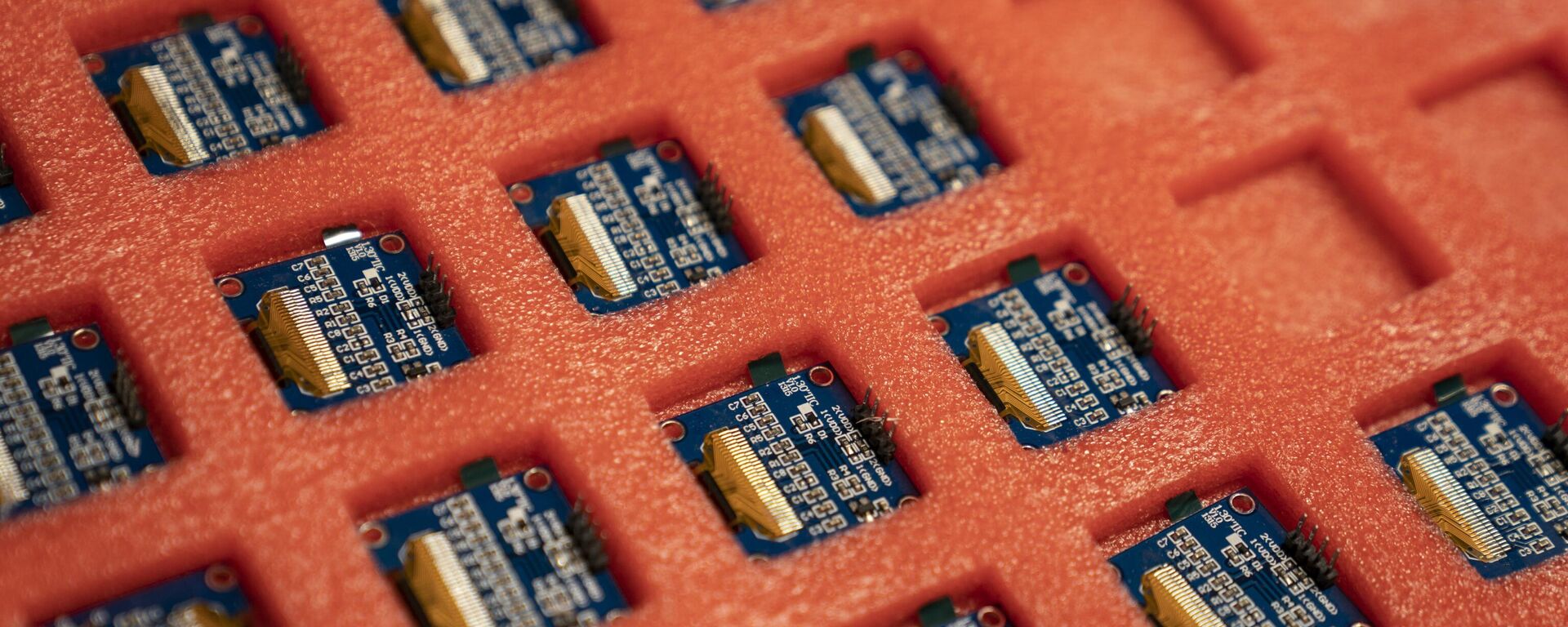https://sputnikglobe.com/20241125/slumping-intel-likely-to-have-grant-funds-slashed-as-bidens-plan-to-rev-up-us-chip-making-falters-1120997205.html
Slumping Intel May Face Cuts in Grant Money as Biden’s Bid to Boost US Chipmakers Struggles
Slumping Intel May Face Cuts in Grant Money as Biden’s Bid to Boost US Chipmakers Struggles
Sputnik International
The Biden administration plans to slash American chip giant Intel’s funding under a preliminary federal grant, The New York Times reported.
2024-11-25T10:38+0000
2024-11-25T10:38+0000
2024-11-25T13:53+0000
world
joe biden
intel
chips
chipmaker
semiconductors
taiwan semiconductor manufacturing company (tsmc)
china
https://cdn1.img.sputnikglobe.com/img/07e8/0b/19/1120995707_0:160:3072:1888_1920x0_80_0_0_0384a0b0a8ca05b2d23c914043b436b9.jpg
The Biden administration plans to slash American chip giant Intel’s funding under a preliminary federal grant, The New York Times reported. Trouble-plagued Intel will get $8 billion instead of the estimated $8.5 billion incentive package of grants it was awarded earlier under the CHIPS and Science Act, insiders told the outlet. Washington has bet heavily on Intel to achieve a «chip-making renaissance» in the country. Hefty subsidies were offered to US-based chipmakers amid Washington’s semiconductor trade war with China. Intel, however, was offered the largest single subsidy package. Besides the federal grant, the Biden administration offered Intel up to $11 billion in federal loans and a 25% tax credit for its investments in new factories.Intel, however, is failing to meet benchmark Commerce Department requirements to get the funds. Seizing on Intel’s woes, Qualcomm executives have reportedly asked if it would consider a sale. Chips for the Military The reported funding cut is said to take into account a $3 billion contract that Intel has been offered for national security-related chip production. Chips with military and intelligence applications would be produced by the US tech giant under the secret Pentagon program, Bloomberg reported in September. Dubbed Secure Enclave, the program will reportedly span several US states where Intel has manufacturing facilities. Washington launched the semiconductor trade spat with Beijing in 2022, with the US Commerce Department prohibiting companies from supplying advanced chips and chip-making equipment to China. The restrictions, along with the CHIPS and Science Act, were portrayed as limiting China’s technological prowess, with the US government citing national security concerns. Washington claimed it was restricting the export of cutting-edge technologies that China could use for military purposes or to enhance its domestic semiconductor capabilities. China, the largest global semiconductors market, checkmated by rolling out its own export restrictions. It accused the US of violating market rules and leading to fragmentation in the global semiconductors market.
https://sputnikglobe.com/20240914/chip-maker-intel-to-get-billions-worth-of-us-grants-for-secret-pentagon-program-1120152350.html
china
2024
News
en_EN
https://cdn1.img.sputnikglobe.com/img/07e8/0b/19/1120995707_171:0:2902:2048_1920x0_80_0_0_7be98cd8b7398dec00736148064f06e6.jpg
american microchips, american chips, trade war, restrictions on chips export, chips export, chipmaker, semiconductors, ai development, chinese ai, us hegemony, semiconductor chips, american semiconductors, semiconductor technology, semiconductor industry, chip race, chips race, semiconductor race, is intel going out of business, will intel sell its chip manufacturing, how and why did intel fall,
american microchips, american chips, trade war, restrictions on chips export, chips export, chipmaker, semiconductors, ai development, chinese ai, us hegemony, semiconductor chips, american semiconductors, semiconductor technology, semiconductor industry, chip race, chips race, semiconductor race, is intel going out of business, will intel sell its chip manufacturing, how and why did intel fall,
As part of measures introduced during his term aimed at curbing China’s hi-tech rise, US president Joe Biden offered hefty subsidies for US-based chip-makers like Intel. But the tech giant’s troubles have become a setback for Washington’s plans to rev up domestic chip manufacturing.
Trouble-plagued Intel will get $8 billion instead of the estimated $8.5 billion incentive package of grants it was awarded earlier under the CHIPS and Science Act, insiders told the outlet.
Intel, however, is failing to meet benchmark Commerce Department requirements to get the funds.
Seizing on Intel’s woes, Qualcomm executives have reportedly asked if it would consider a sale. Chips for the Military
Dubbed Secure Enclave, the program will reportedly span several US states where Intel has manufacturing facilities.
Intel’s woes prove US steadily losing innovation & tech leadership
Intel’s troubles have exposed the US’s feeble semiconductor policy and jeopardized any prospects for a US «chip-making renaissance.»
During his term, Joe Biden introduced measures aimed at curbing China’s… pic.twitter.com/nLHWyAHvQm
— Sputnik (@SputnikInt) September 18, 2024
The CHIPS Act, a bipartisan bill passed in 2022, provided $39 billion in funding to subsidize the construction of facilities to help the US reduce its reliance on foreign production of cutting-edge microchips.
Washington launched the semiconductor trade spat with Beijing in 2022, with the US Commerce Department prohibiting companies from supplying advanced chips and chip-making equipment to China.
China, the largest global semiconductors market, checkmated by rolling out its own export restrictions. It accused the US of violating market rules and leading to fragmentation in the global semiconductors market.


